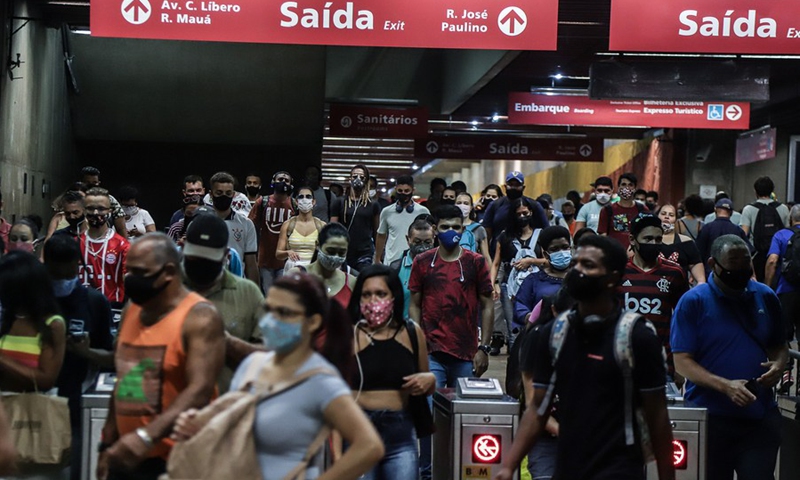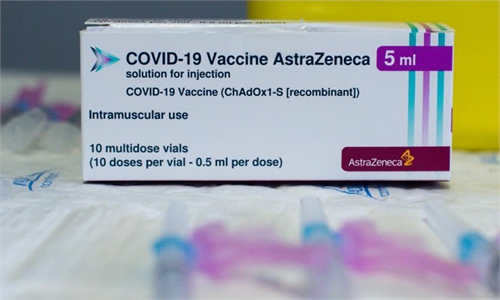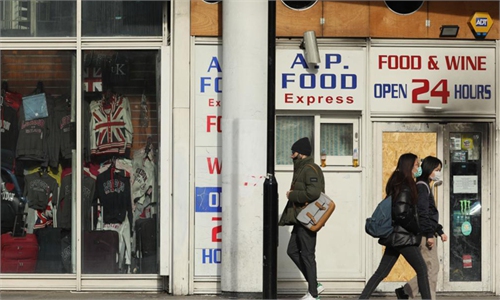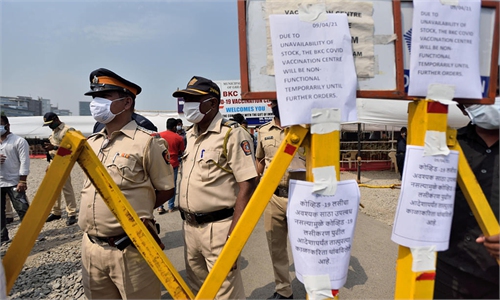Amid uncertainties of global COVID-19 fight, China should hold strong: Global Times editorial

People wearing face masks are seen at a subway station in Sao Paulo, Brazil, Jan. 28, 2021.(Photo: Xinhua)
India, Brazil, Europe, the US, Japan, and South Korea have all seen different degrees of resurgence in the COVID-19 pandemic. The number of infections in India and the number of deaths in Brazil have hit their highest levels since the outbreak. And several European countries are now reconsidering stricter social distancing measures. The number of infections and deaths in the US, the world's fastest vaccinating country, has increased again in the past week. This is casting a shadow over the prevention of the pandemic.
After the local epidemic in Ruili, Southwest China's Yunnan Province, was brought under control, the country has returned to the state of having zero new local infections. However, China's vaccination rate lags behind the expectations of some medical experts. The vaccination rate is lower than that of other countries, such as the US and the UK. The potential problems this gap may cause deserve attention.
There are still many uncertainties facing the global pandemic prevention efforts. The wide use of vaccines will certainly play a protective role, but whether it can constitute the herd immunity that people have expected - as the virus has had variants - and form a powerful barrier to prevent the coronavirus from affecting normal human life, has yet to be tested.
It is also uncertain whether countries such as the US, which has been quick to vaccinate its people, will use the issue as a weapon to engage in unfair practices against other countries in terms of border opening, leading to conflicts over orders of their interexchange. Moreover, the virus is mutating in a race with vaccination rates and vaccine improvement speed. More time is needed to verify which side is moving faster now.
The US response to the COVID-19 so far has been remarkably selfish. The rapidity with which it vaccinates at home contrasts sharply with the stinginess with which it exports the vaccines. This raises concerns that it may then abuse its high vaccination rate, introduce a "vaccine passport" to its advantage in international relations, and turn the border opening of countries into an unfair process that serves only the interests of the US and its major allies.
Faced with a complex environment, China needs to do the following things well.
First, we need to speed up vaccination efforts in China and ensure that by the start of winter this year we reach vaccination levels close to those in the US and Europe. China's large population poses challenges, but China's institutional advantages provide special opportunities to overcome this. Only when we have a high vaccination rate can we be able to play the game with the US in the next stage of the COVID-19 fight. Whether the world will open or not, we can take it in stride.
Second, we need to speed up the approval of several Chinese vaccines into the list of vaccines that are recommended by the World Health Organization. This is crucial to hold back the US' possible abuses in rule-making.
Third, as vaccination coverage gradually increases in China, we need to study and adjust both preventative measures of the epidemic and related social psychology. Perhaps from now on, preventions of the epidemic will still need strong social organizations, as well as a coordination of vaccines and control measures. But when everyone is vaccinated, whether a "zero tolerance" is still necessary should be determined according to the changes around the world.
If infection and fatality rates of COVID-19 go down significantly after all the people in the US and Europe get vaccinated, there will be a sense of success in the fight against the virus in the West. The whole society there may feel relieved, which might start to treat COVID-19 as flu again. However, if the same low-level infection was to occur here in China, our society might have quite different feelings.
The success to prevent the spread of the virus has simultaneously weakened Chinese people's capability to adapting themselves to the epidemic. Therefore, in the future, we need to act accordingly to any new situation.
Fourth, China has exported and donated a large number of doses of vaccines to some developing countries in the past few months. This has demonstrated our sincerity in overcoming the difficulties together with them. This is an advantage of China, rather than a burden. We should continue to balance domestic and foreign demand for vaccines, doing our best to strike a good balance.
The process of controlling the pandemic is complex. It comes with such ferocity and impact on all fronts. In addition to science and humanitarianism, some political elements will brutally have themselves involved. China has no intent to harm any country, but it has to guard against vicious motives. We must remain proactive in the next phase of the global fight against the pandemic. In this way, we can not only defend China's interests, but also safeguard the rights and interests of the developing world at large while helping the humanity put the pandemic under control.



